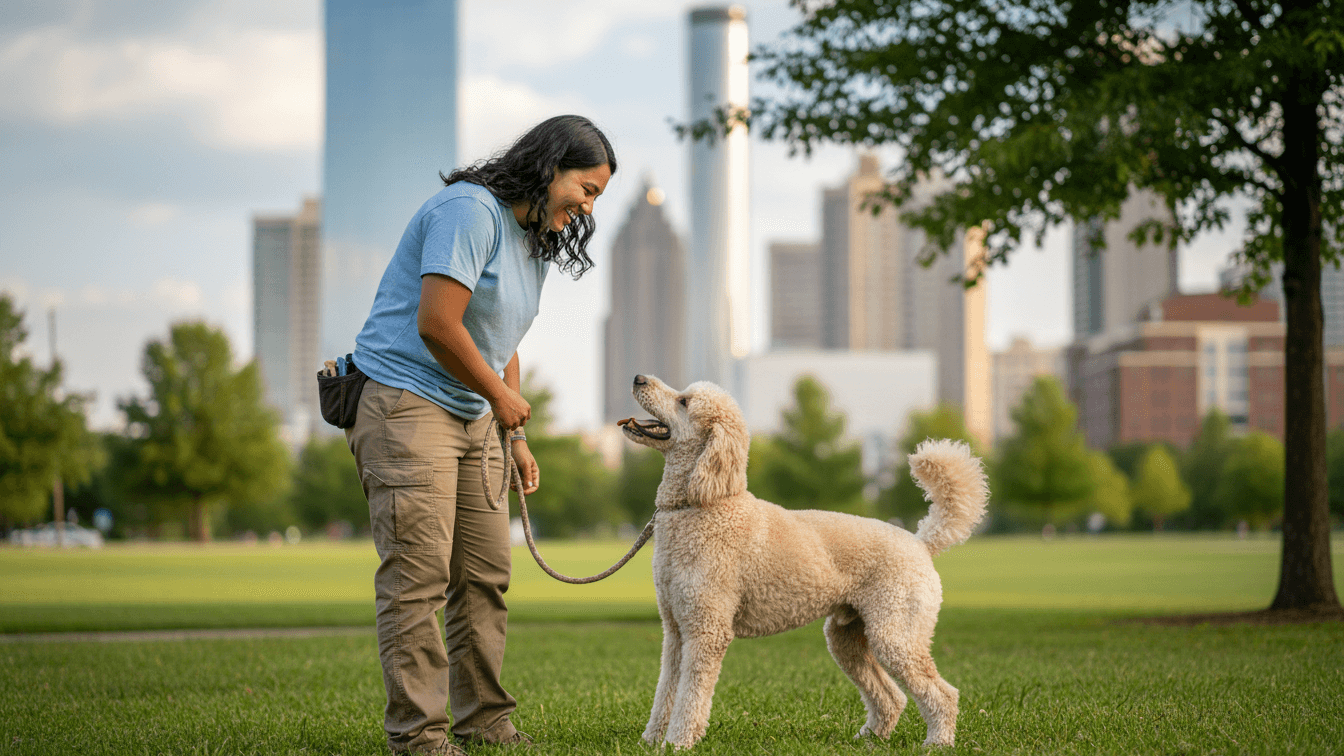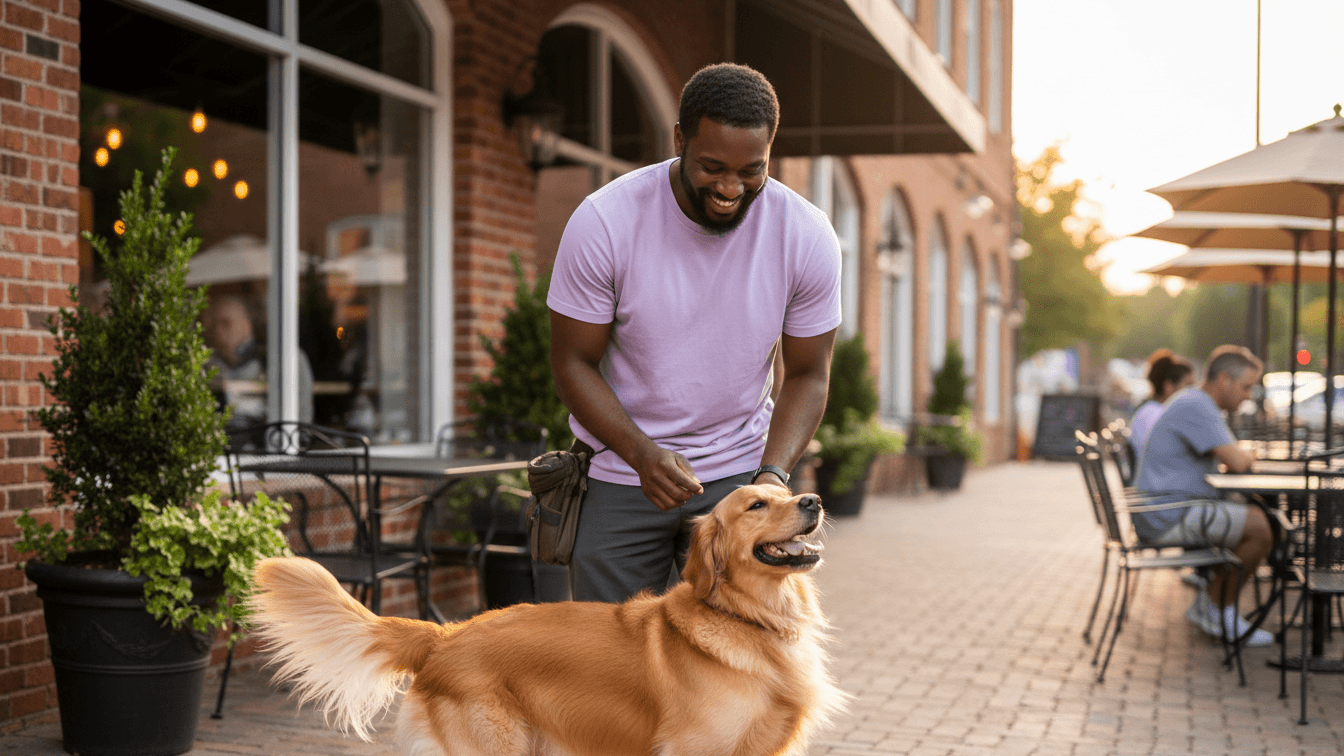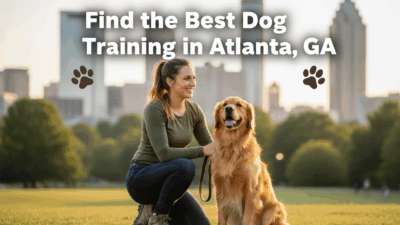Your Complete Guide to Choosing a Dog Trainer in Atlanta
Living with a dog in Atlanta means navigating busy neighborhoods like Buckhead and Virginia-Highland, walking through crowded parks like Piedmont Park, and keeping your pup calm during Braves games or festivals in the Old Fourth Ward. Your dog needs solid skills to handle MARTA stations, outdoor patios along the BeltLine, and the constant stream of joggers and cyclists on city trails.
Since Atlanta sits in Fulton County, most local rules follow both city and county guidelines. When you find a professional dog trainer who understands these Atlanta-specific challenges, you’ll get better results both at home and out in the community.
How to Choose the Right Trainer
Start by looking for someone who uses positive reinforcement training and can set realistic goals for your Atlanta lifestyle. This means your dog should learn to walk calmly on crowded BeltLine sections, stay focused near street performers and food trucks, and handle vet visits in busy Midtown clinics without drama.
Credentials give you a quick way to compare trainers’ experience levels. Common dog trainer certifications include KPA-CTP, CPDT-KA, or IAABC-CDBC for behavior problems. If your dog has serious aggression issues, look for someone with CBCC-KA or a science-based program like CTC.
In-home dog training works great for puppy manners, door greetings, and neighborhood leash skills around Inman Park or Brookhaven. Group classes make sense once your dog can focus around other dogs, especially before you try busy spots like the Freedom Park trail or Westside Park.
Ask about the trainer’s experience with urban dogs. Atlanta dogs face unique challenges like navigating apartment elevators, staying calm during fireworks over Centennial Olympic Park, and ignoring the squirrels that dart across Peachtree Street.
Common Dog Training Methods Explained

Reward-based methods build the trust you want while creating lasting behavior changes. They also help your dog follow Fulton County’s rules about keeping dogs under control in public spaces throughout Atlanta.
Basic obedience covers sit, down, stay, place, recall, and leash training so your dog can handle walks through Ponce City Market, restaurant patios in East Atlanta Village, and park visits without pulling or jumping on people.
Puppy training focuses on socialization, potty training, bite control, crate comfort, and early leash skills. Starting with short, positive training sessions prevents bad habits from forming in the first place, which matters even more in high-density Atlanta neighborhoods where your pup encounters dozens of people and dogs daily.
Behavior modification addresses fear, reactivity, resource guarding, or separation anxiety through careful desensitization and counterconditioning. For serious cases, ask if your trainer works with local veterinarians or behaviorists in the Atlanta area.
Private lessons and dog training services let you customize everything around your daily routines, whether that means practicing at your Morningside apartment building or working on recall at a nearby park. Board and train programs can speed up results when you’re short on time, though it’s important to understand how the trainer will help your dog generalize those skills back to your actual Atlanta environment.
Dog training classes help your dog practice good manners around other dogs and people. The best classes give dogs plenty of space, screen participants carefully, and teach calm behavior rather than just excitement.
Specialized training like therapy dog training or service dog training requires extra structure, public-access skills, and a very clear step-by-step program. Atlanta’s busy hospitals, schools, and public spaces demand a higher level of reliability.
Stay away from trainers who use fear, intimidation, or pain to get results. Humane methods are safer for everyone, easier to maintain long-term, and much better for keeping peace with your neighbors in Atlanta’s tight-knit communities.
Average Cost of Dog Training in Atlanta, GA (Updated for 2025)
Prices around Atlanta and Fulton County depend on the trainer’s experience, how long sessions last, and where the training happens. Here’s what most local pet owners are paying in 2025.
| Service Type | Average Cost (Atlanta/Fulton County) |
|---|---|
| Puppy classes (4-6 weeks) | $175-$300 total |
| Group obedience classes (4-6 weeks) | $180-$325 total |
| Private lessons (60-90 min) | $125-$225 per session |
| In-home coaching packages (4-6 visits) | $475-$1,100 total |
| Day training (trainer works your dog + handoff) | $500-$1,200 per week |
| Behavior consult for reactivity/anxiety (initial) | $175-$300 |
| Board and train (2-4 weeks) | $2,400-$5,500 total |
You’ll probably pay extra travel fees for longer distances within Fulton County or to surrounding areas. Expect higher rates for complex behavior work or if you need sessions during peak Atlanta traffic hours.
Many trainers offer a free consultation or free evaluation before you commit. Make sure you understand what’s included, how the trainer tracks progress, and whether they have experience with the specific challenges Atlanta dog owners face.
Questions to Ask a Potential Dog Trainer
- What training methods do you use, and how do you keep training sessions positive and low-stress?
- What credentials do you have, like KPA-CTP or CPDT-KA? Do you keep up with continuing education such as CPDT-KSA?
- How will you customize the training program for my dog’s specific needs and our Atlanta lifestyle?
- Do you offer in-home visits, group classes, or day training, and which approach fits my goals best?
- How will we measure my dog’s progress and know when to add more distractions like BeltLine crowds or MARTA noise?
- What are the total costs, including any travel fees, and what’s your cancellation policy?
- Do you carry liability insurance, and can you show me proof?
- For behavior problems, will you work with my veterinarian if needed?
- What should I practice between our sessions to help my dog keep improving?
- Have you worked with dogs in high-density urban environments like Atlanta before?
Local Atlanta Rules and Considerations
Atlanta enforces leash laws and nuisance rules to keep parks and neighborhoods safe for everyone. Fulton County follows Georgia’s public health requirements too.
Leashes are required in all public spaces except inside designated off-leash dog parks. Keep a standard 6-foot leash with you for city greenways, the BeltLine, and community events.
Georgia law requires current rabies vaccination for all dogs over 12 weeks old. You can get these through county clinics or your regular vet. More details are available through the Georgia Department of Public Health.
Excessive barking can be considered a nuisance under Atlanta city ordinances, so work with your trainer on alert barking and separation anxiety before neighbors start complaining. This matters even more in dense neighborhoods like Midtown or Decatur where walls are thin.
If your trainer wants to use city parks for commercial sessions, they may need permits and proof of insurance from the Atlanta Department of Parks and Recreation.
Georgia doesn’t require special licenses for dog trainers, but if a business boards dogs for payment, the state’s Department of Agriculture oversees kennel licensing requirements.
Fulton County Animal Services provides resources for lost pets, microchips, spay/neuter programs, and other county services.
Local Atlanta Resources for Dog Owners
These spots give you great places to practice polite manners, work on recalls, and provide safe enrichment for your dog. Always follow the posted rules and etiquette guidelines.
- Piedmont Park Dog Park offers two fenced areas for different dog sizes right in Midtown. Practice recalls and calm greetings during quieter morning hours before the lunch crowds arrive.
- Fetch Park at the Chattahoochee offers a massive off-leash area along the Chattahoochee River where your dog can swim and practice advanced recall skills in a natural setting.
- Woodruff Park Dog Park in downtown Atlanta provides a convenient fenced space for city dogs to burn energy and work on socialization near Georgia State University.
- Grant Park offers beautiful walking paths and open spaces for leashed training, though dogs aren’t allowed inside Zoo Atlanta itself.
- The Atlanta BeltLine welcomes leashed dogs along its entire path, giving you miles of urban trails perfect for practicing loose-leash walking and building focus around cyclists, runners, and other dogs.
- Arabia Mountain National Heritage Area just outside Atlanta offers dog-friendly trails where you can work on recall and focus around wildlife and hiking families.

FAQs
How much does in-home dog training cost?
Most Atlanta trainers charge $125-$225 per in-home visit, with discounts available when you buy packages. Behavior problems typically start at the higher end of that range.
Is in-home dog training worth it?
Absolutely, because you’re working on problems exactly where they happen. Your trainer can fix door manners, jumping on guests, counter-surfing, and reactivity to hallway noises right at home, then step outside to practice leash skills on your actual Atlanta sidewalks or apartment complex grounds.
Can you pay someone to house train your dog?
Yes, many trainers offer puppy training programs that include potty training, crate routines, and daily schedules. Day training can speed up the process while teaching you how to maintain the progress, which is especially helpful for Atlanta apartment dwellers without easy yard access.
What is the 3-3-3 rule for dog training?
This is a helpful timeline for new or adopted dogs: expect about 3 days for your dog to decompress, 3 weeks to learn your routines, and 3 months to feel completely settled. Good training plans work with this natural adjustment period, giving your dog time to adapt to Atlanta’s urban noise and activity levels.
How long will it take to reach my training goals?
Most puppies and friendly adult dogs show solid progress within 4-8 weeks if you practice daily. Fear, reactivity, or separation anxiety typically requires several months of careful behavior modification with gradual increases in difficulty. Urban environments like Atlanta can take longer because there are more triggers to work through.
What should I bring to group classes?
Pack a flat collar or harness, a 6-foot leash, high-value treats, water, and current vaccination records if your trainer requests them. Leave retractable leashes at home for safety reasons.
What’s the leash law in Atlanta?
Dogs must be leashed and under control in all public areas, except inside designated off-leash dog parks. Keep that 6-foot leash handy for the BeltLine, Piedmont Park trails, and city sidewalks throughout Atlanta.
Do I need a dog license in Atlanta or Fulton County?
Fulton County requires dog licenses for all dogs over 12 weeks old. You can get a license through Fulton County Animal Services. Licenses cost less if your dog is spayed or neutered, and you’ll need proof of current rabies vaccination.
What shots does my dog need in Fulton County or Georgia?
Rabies vaccination is required throughout Georgia for all dogs over 12 weeks old. Your veterinarian may also recommend distemper-parvo, bordetella, and leptospirosis based on your dog’s lifestyle. Check state guidelines through the Georgia Department of Public Health.
Are dog trainers required to be licensed in Atlanta or Fulton County or Georgia?
No special trainer licenses exist in Georgia. Trainers follow normal business regulations, but if they offer board and train services, their facility may need to be licensed as a boarding kennel under Georgia Department of Agriculture regulations.
Where can I practice off-leash recall?
Use fenced dog parks like Piedmont Park Dog Park, Fetch Park at the Chattahoochee, or Woodruff Park Dog Park to keep things safe and legal. Try visiting during quieter hours when you’re starting out. These spaces let you work on reliable recall before testing skills in more challenging environments.
Which dog parks allow training around Atlanta?
All city dog parks technically allow training as long as you’re respectful of other users. Piedmont Park Dog Park, Fetch Park, and Woodruff Park Dog Park all work well for practice sessions. Visit during off-peak hours if you need more space to work with a reactive dog or practice advanced skills.
What beaches or trails allow dogs for training?
While Atlanta doesn’t have ocean beaches, the Chattahoochee River National Recreation Area offers multiple access points where leashed dogs can enjoy trails and some swimming areas. Arabia Mountain National Heritage Area provides miles of dog-friendly trails perfect for building focus around wildlife. Kennesaw Mountain National Battlefield Park allows leashed dogs on most trails, giving you elevation changes and varied terrain for advanced training.
How do I help my dog adjust to Atlanta’s urban environment?
Start with short exposure sessions during quieter times of day. Gradually introduce your dog to MARTA sounds, street performers, and heavy foot traffic. Reward calm behavior consistently and never force your dog into situations that cause fear. Work with a certified dog trainer who understands urban socialization if your dog shows signs of anxiety.
Can my dog ride MARTA?
Yes, small dogs in carriers are allowed on MARTA buses and trains. Larger dogs must be service animals to ride. If you’re training a service dog, work with expert dog trainers who understand public transit requirements and can help your dog learn to settle calmly during rides.
What if my dog is reactive to other dogs on walks?
Atlanta’s density makes reactivity especially challenging since you’ll encounter dogs constantly. A behavior modification plan using positive reinforcement training can help your dog learn to stay calm when passing other dogs. Many trainers offer specialized reactivity protocols that teach alternate behaviors and build confidence through careful exposure.
The right combination of thoughtful planning, humane methods, and consistent practice around Atlanta’s parks and neighborhoods will help your dog become a confident, well-behaved dog. Whether you’re walking through Inman Park, grabbing coffee in Virginia-Highland, or exploring trails at the Chattahoochee, good training for dogs makes every outing more enjoyable for everyone involved.
